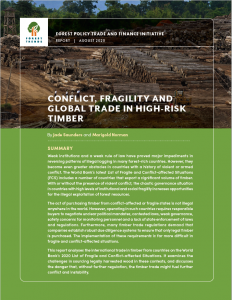Conflict, Fragility, and Global Trade in High-Risk Timber
By Jade Saunders and Marigold Norman View PublicationWeak institutions and a weak rule of law have proved major impediments in reversing patterns of illegal logging in many forest-rich countries. However, they become even greater obstacles in countries with a history of violent or armed conflict. The World Bank’s latest List of Fragile and Conflict-affected Situations (FCS) includes a number of countries that export a significant volume of timber. With or without the presence of violent conflict, the chaotic governance situation in countries with high levels of institutional and social fragility increases opportunities for the illegal exploitation of forest resources.
The act of purchasing timber from conflict-affected or fragile states is not illegal anywhere in the world. However, operating in such countries requires responsible buyers to negotiate unclear political mandates, contested laws, weak governance, safety concerns for monitoring personnel and a lack of state enforcement of laws and regulations. Furthermore, many timber trade regulations demand that companies establish robust due diligence systems to ensure that only legal timber is purchased. The implementation of these requirements is far more difficult in fragile and conflict-affected situations.
This report analyzes the international trade in timber from countries on the World Bank’s 2020 List of Fragile and Conflict-affected Situations. It examines the challenges in sourcing legally harvested wood in these contexts, and discusses the danger that the timber trade might fuel further conflict and instability.

